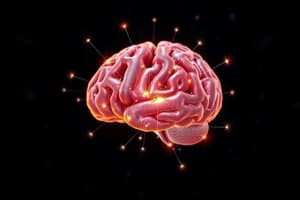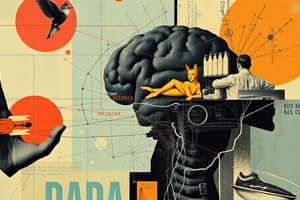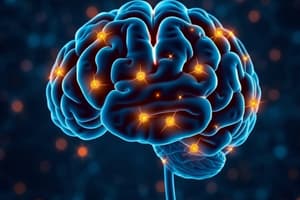Podcast
Questions and Answers
What does the ventral-dorsal gradient reflect in its organization?
What does the ventral-dorsal gradient reflect in its organization?
The frontal pole is associated with less abstract representations.
The frontal pole is associated with less abstract representations.
False
What are the two primary visual pathways mentioned in the content?
What are the two primary visual pathways mentioned in the content?
Ventral and dorsal visual pathways
The _____ cortex is where abstract intentions are translated into movement.
The _____ cortex is where abstract intentions are translated into movement.
Signup and view all the answers
Match the following gradients with their descriptions:
Match the following gradients with their descriptions:
Signup and view all the answers
Which region integrates external information relevant for goal-oriented behavior?
Which region integrates external information relevant for goal-oriented behavior?
Signup and view all the answers
Neurons in the PFC of monkeys are inactive during the delay period in delayed-response tasks.
Neurons in the PFC of monkeys are inactive during the delay period in delayed-response tasks.
Signup and view all the answers
What concept is working memory based on, according to the content?
What concept is working memory based on, according to the content?
Signup and view all the answers
Which gradient does NOT contribute to PFC processing differences?
Which gradient does NOT contribute to PFC processing differences?
Signup and view all the answers
Dopamine activity increases regardless of whether the reinforcement is positive or negative.
Dopamine activity increases regardless of whether the reinforcement is positive or negative.
Signup and view all the answers
The _____ predicts the BOLD response in the ventral striatum.
The _____ predicts the BOLD response in the ventral striatum.
Signup and view all the answers
Match the following cues with their associated outcomes:
Match the following cues with their associated outcomes:
Signup and view all the answers
What does a negative reward prediction error indicate?
What does a negative reward prediction error indicate?
Signup and view all the answers
In decision making, it is always better to choose the option with the higher immediate payoff.
In decision making, it is always better to choose the option with the higher immediate payoff.
Signup and view all the answers
Which system do neurons that code for valence belong to?
Which system do neurons that code for valence belong to?
Signup and view all the answers
Which factors contribute to the subjective value of an item?
Which factors contribute to the subjective value of an item?
Signup and view all the answers
Reward prediction error (RPE) is solely based on the actual reward received.
Reward prediction error (RPE) is solely based on the actual reward received.
Signup and view all the answers
What part of the brain is primarily implicated in value representation?
What part of the brain is primarily implicated in value representation?
Signup and view all the answers
Match the following concepts with their descriptions:
Match the following concepts with their descriptions:
Signup and view all the answers
What is meant by the term 'temporal discounting' in the context of value representation?
What is meant by the term 'temporal discounting' in the context of value representation?
Signup and view all the answers
What is a primary function of cognitive control?
What is a primary function of cognitive control?
Signup and view all the answers
Cognitive control does not play a role in goal-oriented behavior.
Cognitive control does not play a role in goal-oriented behavior.
Signup and view all the answers
What part of the brain is necessary for working memory?
What part of the brain is necessary for working memory?
Signup and view all the answers
Patients with ______ lesions may exhibit difficulty in executing a plan.
Patients with ______ lesions may exhibit difficulty in executing a plan.
Signup and view all the answers
Match the components of the prefrontal cortex to their descriptions:
Match the components of the prefrontal cortex to their descriptions:
Signup and view all the answers
Which of the following is NOT a factor that can compromise mental health?
Which of the following is NOT a factor that can compromise mental health?
Signup and view all the answers
Working memory is essential for cognitive control.
Working memory is essential for cognitive control.
Signup and view all the answers
What deficits are often found in individuals with compromised cognitive control?
What deficits are often found in individuals with compromised cognitive control?
Signup and view all the answers
Cognitive control is important only when dealing with a single goal.
Cognitive control is important only when dealing with a single goal.
Signup and view all the answers
What region of the brain is primarily involved in the retrieval and selection of task-relevant information?
What region of the brain is primarily involved in the retrieval and selection of task-relevant information?
Signup and view all the answers
The prefrontal cortex helps make _____ selection more efficient.
The prefrontal cortex helps make _____ selection more efficient.
Signup and view all the answers
Match the following terms with their definitions:
Match the following terms with their definitions:
Signup and view all the answers
Which of the following describes a potential cost of using experience to guide action selection?
Which of the following describes a potential cost of using experience to guide action selection?
Signup and view all the answers
With practice, individuals become less efficient in shifting between different goals.
With practice, individuals become less efficient in shifting between different goals.
Signup and view all the answers
What happens to task-relevant information in working memory according to the cognitive processes involved in goal-oriented behavior?
What happens to task-relevant information in working memory according to the cognitive processes involved in goal-oriented behavior?
Signup and view all the answers
Study Notes
Cognitive Control Overview
- Cognitive control encompasses mental abilities like planning, information regulation, and behavior management.
- Essential for flexible, goal-oriented actions, enabling efficient information processing.
Prefrontal Cortex Functions
- Four main components: lateral prefrontal cortex, frontal pole, orbitofrontal cortex, medial frontal cortex.
- Crucial for supporting working memory but not associative memory.
- Involved in the maintenance and manipulation of information during cognitive tasks.
Cognitive Control Deficits
- Frontal lobe lesions impair planning and can lead to stimulus-driven behavior.
- Cognitive control deficits are prevalent in psychiatric disorders and influenced by stress and loneliness.
Working Memory
- Defined as the information combining task goals with relevant perceptual and long-term knowledge.
- Neurons in the prefrontal cortex show sustained activity during delay periods in tasks, indicating how information remains active.
Organizational Principles of Prefrontal Cortex
- Ventral-dorsal gradient: organization based on maintenance and manipulation of knowledge.
- Anterior-posterior gradient: anterior regions engage in abstract thought, while posterior areas translate intentions into actions.
- Lateral-medial gradient: lateral areas focus on external task-relevant information, medial regions relate to personal history and emotions.
Decision Making and Value Assessment
- Decision-making evaluates expected outcomes among multiple options.
- Subjective value includes variables like payoff amount, context, and probability.
- The orbitofrontal cortex plays a role in representing value and incorporates reward prediction errors for updating value information.
Goal Planning and Action Execution
- Successful goal execution requires goal identification, subgoal development, and anticipation of consequences.
- Retrieving and selecting task-relevant information is crucial for maintaining focus and achieving goals.
Cognitive Control in Multitasking
- Cognitive control aids in maintaining multiple unrelated goals, enhancing efficiency through learned connectivity patterns.
- Task-relevant information selection streamlines action selection processes, although it may introduce cognitive costs.
Neural Mechanisms
- Changes in Dopamine neuron activity illustrate prediction errors and salience signaling for decision-making and goal-oriented behavior.
- Relying on external cues can override internal predictive processes, highlighting the dynamic nature of cognitive control in response to environmental changes.
Studying That Suits You
Use AI to generate personalized quizzes and flashcards to suit your learning preferences.
Related Documents
Description
Test your knowledge on cognitive control mechanisms related to planning, working memory, and decision-making. Explore the neural processes that allow organisms to execute complex behaviors and how they manage task-relevant information. This quiz will challenge your understanding of the brain's ability to evaluate sensory information for making decisions.




